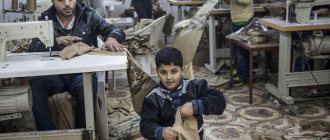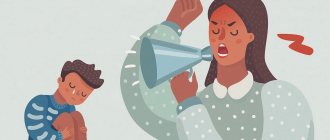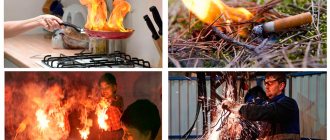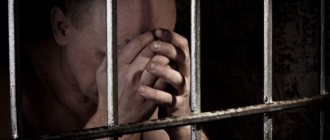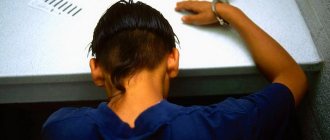Currently, Article 156 of the Criminal Code provides for certain sanctions for child abuse, including imprisonment for a certain period.
As practice shows, cases of psychological and physical violence against children occur quite often. At risk are children from disadvantaged families, whose parents are not involved in their upbringing and development, do not work anywhere and lead an immoral lifestyle. You can learn more about all this from this article.
What is this?
What constitutes child abuse? Article 156 of the Criminal Code defines sanctions for such an attitude of adults towards a person who is under 18 years of age.
Child abuse refers to the use of physical and psychological violence against a child by adults. In the first case, the child can be beaten by his own parents, but they do it unnoticed by the people around him. Therefore, if citizens constantly hear the screams and plaintive crying of a child behind the wall, then it is best to inform the local police officer or call the guardianship authorities of your city.
Psychological violence manifests itself in the constant humiliation of the child and insult to his dignity (for example, the use of obscene language towards the baby).
Thus, in the first and second cases, the child receives severe psychological trauma, which has the most negative impact on his future life.
Can a parent use force?
Estimates of how children should be raised vary significantly. Professional teachers and psychologists today unanimously speak about the inadmissibility of the use of force in raising children. The negative consequences of such upbringing are well known and are directly related to the aggression of children and adolescents, as well as their illegal activities. Simply put, if you don’t want your children to become uncontrollable and aggressive, don’t set such an example for them with your own behavior.
But this is the opinion of teachers, and parents do not always follow it. The stereotype that the belt is the best educator is still widespread. It is based both on the own experience of parents who were raised this way, and on the conviction that it will not be possible to raise children in other ways.
In practice, all this results in constant shouting at children, often using obscene language, as well as slaps and spankings. Some grief-stricken parents go even further, using more tangible violent methods of influence on their children.
The law, unlike morality, does not allow for different assessments of such actions. For insult, including obscene language, the perpetrator can be held accountable only if the victim goes to court. In the case of abuse of children by their parents, such treatment is not received, given the dependent position of the children themselves on their parents. But teachers or guardianship officials can submit a corresponding application to law enforcement agencies. In practice, this service does not contact law enforcement agencies only because of verbal insults (which can also be regarded as psychological violence). But in case of systematic physical violence, she is obliged to take action, including contacting the police.
From a legal point of view
Child abuse is unacceptable and punishable by law. Moreover, Article 19 of the Convention on the Rights of the Child states that all parties to this Convention, including Russia, must take all possible measures to protect children from all forms of violence. You need to know this.
In Russia, liability for child abuse is provided for in criminal, administrative and family legislation.
What can parents expect in this case if they treat their offspring poorly who need care and attention? From the point of view of family law, these citizens may be limited or even deprived of parental rights to their children. However, these are only small implications of what could happen.
If a child has been subjected to humiliation or physical violence, then such parents will face criminal liability. This should be remembered.
FAMILY CODE OF THE RUSSIAN FEDERATION
Article 65. Exercise of parental rights
1. Parental rights cannot be exercised in conflict with the interests of children.
Ensuring the interests of children should be the main concern of their parents. When exercising parental rights, parents do not have the right to cause harm to the physical and mental health of children or their moral development. Methods of raising children must exclude neglectful, cruel, rude, degrading treatment, insult or exploitation of children. Parents who exercise parental rights to the detriment of the rights and interests of children are liable in accordance with the procedure established by law.
What applies
It was previously stated that Article 156 of the Criminal Code provides for sanctions for parents for child abuse. The same applies to employees of educational and medical organizations (due to improper performance of their duties in the upbringing and development of minors).
But how does this manifest itself? The following actions of adults towards minors must be considered cruel treatment:
- physical impact on the child (this is most often beatings, which may not be noticeable at first glance);
- depriving the baby of food and water;
- leaving a child without proper supervision and care when this threatens his life (for example, a mother left her newborn for the whole day without care, and she left home on her own business);
- insulting the baby and humiliating his dignity (manifests itself in single-parent families, when the mother raises the child alone and takes out her anger on him).
Of course, that's not all. These are the most basic examples of child abuse. This should not normally happen. Parents have a responsibility to care for their children. The same applies to teachers in kindergartens and other educational and medical institutions.
If the latter do not care for minors, show aggression towards them, insult and humiliate them, then sanctions for child abuse may be applied to them. In the Russian Federation, Article 156 of the Criminal Code provides for quite severe punishments for such criminal actions. Need to know about.
Article - Take care of children
The main causes of child abuse are social in nature. This is especially true for physical and sexual violence, which are most often practiced in families where it is not customary to take into account the norms of ethics and morality.
Here is an approximate list of factors that in most cases cause abuse:
- single-parent, low-income families;
- families in which one of the parents is not a blood relative of the child (stepfather, stepmother);
- parents lack a permanent place of work;
- criminal history of parents or other adult family members;
- the presence of one or both parents with alcohol or drug addiction;
- low level of education and culture within the family;
- the child has mental, mental or physical disabilities, etc.
Families in which several factors are present at once fall into the high-risk group, and in practice this is exactly what happens: it is difficult to find a family of alcoholics or drug addicts who have a stable income and high moral principles.
But, unfortunately, external well-being is not always a guarantee of a respectful attitude towards a child within the family - quite often well-educated people use violence, especially psychological violence, against their children and, most regrettably, do not see anything bad or unnatural in it.
Violence against children in the family: types
The category of “ child abuse ” includes any violence against a child by parents or those to whom their functions are assigned by law (for example, guardians or trustees, orphanage teachers, etc.), as well as other older family members. However, it does not necessarily have to be expressed in the use of corporal punishment or in the form of sexual harassment - psychological violence is no less dangerous.
The inadmissibility of child abuse is legally enshrined both at the international and national levels: Article 19 of the Convention on the Rights of the Child obliges all states participating in it to take all possible measures to protect children from all forms of violence. In Russian legislation, responsibility for such actions is provided for in many branches of law: criminal, family, administrative, etc.
Physical violence
Beatings (both single and systematic), bodily harm, any other physical impact on a child, as well as deliberate deprivation of food, water and the opportunity to perform natural needs, other bullying and torture - all this is classified as violence, regardless of the severity of the consequences , which only affects the degree of responsibility.
Sexual violence
It means sexually motivated harassment, involvement of a child in actions of a corresponding nature, demonstration of genitals or any works of pornographic content (illustrations, books, films, videos, etc.).
Important: a child under 16 years of age has total sexual integrity. Therefore, his consent to participate in such actions does not mean the absence of a violent component in them. Due to their age and mental characteristics, children and adolescents are not able to understand the inadmissibility of such behavior towards them, as well as the degree of harm caused.
Emotional (mental) abuse
This is the most difficult type of child abuse , but at the same time the most frequently used in families. This is especially true for cells of society with a reduced cultural level. Mental violence can take the following forms:
- uttering threats against a child (including in the form of blackmail - for example, the threat of beating in case of failure to comply with parental demands, disobedience, poor performance, etc.);
- insult, humiliation (name calling, harsh criticism, etc.);
- demonstration of neglect both for the child himself and for his needs and interests (including restriction without objective motivation of the child’s communication with peers, refusal to provide conditions for development, etc.).
Despite the apparent insignificance of the consequences of emotional violence compared to physical or sexual violence, the result of psychological influence is often the formation of pathological and other negative character traits in the child, a shift in the value system, and the emergence of difficulties in socialization.
Protecting children from violence: helpline, contacting special services
A hotline dedicated to protecting children's rights is available in every major city. If desired and necessary, the phone number can always be found on the Internet. However, the problem is that children who are abused are often raised in dysfunctional families that suffer permanent financial difficulties (that is, not everyone has access to the global network).
In addition, according to statistics, a low cultural level and, as a consequence, the possibility of child abuse is most typical for residents of small settlements, where the necessary helpline is extremely rarely organized.
In such cases, the optimal protection of children from violence is to contact the guardianship and trusteeship authorities, as well as the juvenile affairs inspectorate, which exist in each police department. The initiative to appeal can come from the child himself, suffering from cruel treatment, or from any other person who is not indifferent to his fate.
The duties of the authorized bodies include conducting a thorough objective inspection of the child’s living conditions, based on the results of which one of the following decisions can be made:
- transfer of materials to the police or prosecutor's office for a decision to initiate proceedings against parents or other family members for child abuse
- sending to the prosecutor's office a conclusion on the advisability of depriving parents of parental rights (or restricting rights) and transferring the child to the care of other relatives or to a specialized children's institution;
- issuing a warning to parents and placing the family under control, followed by systematic checks (as a rule, an order is issued to change lifestyle - for example, compulsory employment, undergoing treatment for alcohol or drug addiction, inadmissibility of using any kind of violence against the child, etc.) .
Responsibility for child abuse
legal registration
Abuse of children in Russia invariably entails liability - criminal, civil or administrative. Thus, in accordance with Article 156 of the Criminal Code of the Russian Federation, parents or persons called upon to replace them by force of law are subject to punishment in the form of imprisonment for up to 3 years or the payment of a large fine for using violence against a child.
This norm also applies equally to teachers, educators or employees of institutions supervising children left without parental care (orphanages, orphanages, shelters, etc.).
Important: when causing bodily harm to a child, committing indecent acts against him, sexual harassment or sexual violence, the perpetrators are also charged with other crimes in addition to Article 156. For example, if, as a result of cruel treatment, the child’s health was harmed to moderate severity, the actions of the parent (other person) who used violence are subject to qualification under Articles 156 and 112 of the Criminal Code of the Russian Federation.
In addition to a criminal record, unscrupulous parents risk being subject to a much harsher sanction - deprivation of parental rights, as clearly evidenced by Article 69 of the Family Code of the Russian Federation. This measure may be irreversible: with the advent of elements of juvenile justice in Russia, the procedure for restoring parental rights has become much more complicated than the procedure for depriving them.
Contrary to popular belief, it is quite possible to prove the use of violence against a child, even if the latter denies it: a routine medical examination, appearance at a child care facility with obvious signs of beatings, testimony from neighbors - this is more than enough to hold parents accountable.
The situation is more difficult with proving violence of a psychological nature, however, in this case there are ways: pathological changes in the emotional state of the child are an indisputable basis for an inspection by representatives of the guardianship and trusteeship authorities.
Preventing child abuse
Another important duty of the guardianship authorities is the prevention of child abuse . For this purpose, there are specially developed programs and instructions that contain the following measures:
- identification of disadvantaged families and low-income families (usually in collaboration with the police, in particular with district commissioners and inspectors of the Internal Affairs Directorate);
- conducting preventive conversations with parents at risk;
- control of visits by minors to educational institutions adequate to their age and development;
- organizing interaction with local pediatricians and representatives of educational institutions;
- monitoring of reports received by the police about missing minors (including those related to permanent long-term absence from home);
- assistance in finding employment for members of low-income families and organizing their treatment for alcohol and drug addiction.
This list is far from complete; the basic principles of the work of guardianship authorities are an individual approach and compliance with the law. Therefore, if the use of violence against a child was one-time in nature and was the exception rather than the rule, no special sanctions will follow. However, the possibility of coming to the attention and close attention of authorized organizations still exists.
Intentionally or not
As stated earlier, criminal liability for child abuse (Article 156 of the Criminal Code in this case even provides for imprisonment) occurs when this is combined with failure to fulfill the duties of raising a minor. Otherwise, it will not be possible to identify the elements of a criminal act.
It should also be noted here that child abuse is always intentional and not accidental. For example, a mother left a small child alone in an apartment without care or supervision, without food, and she left the apartment, knowing full well that the baby would cry from fear and hunger. In this case it was done intentionally.
If a child is subjected to beatings that do not entail a serious health disorder, then the actions of the perpetrators are also qualified under Article 156 of the Criminal Code.
Who can be punished
For cruel treatment of children, Article 156 of the Criminal Code establishes the punishment that the following persons will bear:
- parents, as well as guardians or trustees (since the latter, instead of mom and dad, are involved in raising a minor child and treat him poorly);
- teaching staff or other employees of educational and medical organizations;
- employees of special services who are required to supervise children.
Thus, not only the legal representatives of children, but also other persons whose professional responsibilities include caring for and supervising minors can be found guilty of this crime.
What kind of punishment?
What awaits the perpetrators if they fail to fulfill their duties to raise a minor? What sanctions are established for child abuse under Article 156 of the Criminal Code of the Russian Federation? The answers to these questions are of interest to many citizens who are not indifferent to this problem.
So, the sanctions specified in Article 156 of the Criminal Code of the Russian Federation will be as follows:
- a fine of up to 100 thousand or salary or other income of the perpetrator for a period of up to 1 year;
- compulsory work up to 440 hours;
- correctional labor for up to two years;
- forced labor for a period of up to three years with deprivation of the right to engage in certain activities for up to five years or without additional punishment;
- isolation from society for up to three years with the application of additional sanctions in the form of deprivation of the right to hold certain positions for up to five years or without it.
Thus, the perpetrators will suffer a certain punishment for their crime, but what it will be will be decided only by the judicial authority.
Prevention
What does a parent expect for child abuse? Which article in Russian legislation provides for sanctions for this act? It must be said right away that nothing can be worse than a parent’s bad attitude towards their own child. However, in practice, different situations occur.
In the event that the mother or father, as well as both parents, do not fulfill their duties in raising their baby, and also treat him cruelly (beating, not feeding, insulting and humiliating), then they will be prosecuted under Article 156 of the Criminal Code . Also, such people are deprived of parental rights.
Should child abuse be prevented? Article 156 of the Criminal Code contains only sanctions for the crime committed. However, guardianship authorities, as well as the police, must work with citizens who lead an asocial lifestyle, do not work anywhere and do not take care of their children. In addition, work to prevent domestic violence and abuse of minors should be comprehensive and affect not only dysfunctional and antisocial families, but also two-parent families. To do this, people from guardianship authorities and police officers attend parent meetings in kindergartens, schools, and boarding schools.
Classification
Domestic violence affects the emotional and physical health of the younger generation.
Forms of child abuse:
- physical violence;
- child sexual abuse;
- emotional;
- neglect.
Each type of child abuse has its own characteristics and characteristics, but differs in that it brings severe emotional trauma to the child.
The purpose of the family is to give the child the feeling that he is important and that his significance is high, that his parents will always protect him. But an emotionally wounded child feels like a burden and an unnecessary part of the home. He is constantly waiting for a blow and does not know what awaits him in the future.
Physical
Physical abuse of children manifests itself in causing bodily injury to a child. Guardians, parents and those responsible for the child use this form of violence not so much deliberately as through negligence, losing self-control and control over their actions.
There are parents who believe that physically punishing a child is part of educational measures. But there is a fine line between beating a child and parenting, which is crossed to the detriment of the child. By constantly applying harsh punishment, children lose trust in their parents and are constantly pathologically afraid of them.
Direct physical violence includes:
- bruises, broken limbs, cuts;
- burns, for example from a cigarette;
- bites;
- shaking, falling, blows to the abdominal cavity;
- head injuries.
So, by using physical force at the moment of anger and loss of control, a parent risks injuring the child and his psyche, after which it will be difficult or impossible for him to recover.
Sexual
Child sexual abuse is a series of acts in which a child is used to stimulate an adult's sexual fantasies or engages in actual forced sexual intercourse.
Abuse of the younger generation in this form is dangerous, as it is difficult to detect or notice signs on the child’s body. The latter is afraid to tell adults about this because of a feeling of humiliation, fear and guilt. The boy blames himself for his actions and it seems to him that if he had behaved better, if he had been obedient, this would not have happened.
Violence of this kind is not only forcing a minor to engage in sexual intercourse with an adult, but also a number of the following actions:
- coercion to perform stimulating actions;
- caress an adult;
- perform actions in the position he indicates;
- watching pornographic films and videos together.
Emotional
Every form of violence causes severe emotional trauma. And any kind of violence directly affects the emotional health of the child. But there are a number of actions aimed directly at influencing the child’s psyche:
- statements - insult and humiliation of a child;
- the child’s actions and words are ridiculed;
- little is threatened verbally;
- everything the child does is criticized;
- minors are isolated from communication with peers;
- children are abused.
The purpose of family is to show care and give love to each other. When minors do not receive this and receive cruelty in return, they suffer from a sense of inferiority.
Neglect
One form of child abuse is neglect of his basic needs. Divided into several types:
- physical needs: provision of food, clothing, housing, provision of heat, etc.;
- emotional needs: lack of affection and love from the older generation, refusal to communicate with the little one, isolating him from communication with other peers or adults, in some cases, a ban on going to school, to neighbors, to the store, etc.;
- educational needs: prohibition to attend educational institutions, documents for school are not provided, necessary school supplies are not purchased.
Children who are neglected grow up alienated, filled with loneliness, feelings of worthlessness and uselessness to anyone.
The cultural context of violence and physical punishment is also important. A number of countries actively practice and partially tolerate violence against women, adolescents and children as a measure of punishment for the offender. The limits of acceptable punishment depend on the extreme views a country can tolerate. Accordingly, this affects punishment or a loyal attitude towards the perpetrator.
A popular form of neglect is when parents refuse to vaccinate their child for religious, cultural, or scientific reasons. If the baby’s health is in order, there is no need to find out the reason for refusing such activities. But if the child’s fortune is in jeopardy, parents can be punished by law.
Why does this happen
Currently, the problem of child abuse is quite acute. In fact, it shouldn't exist at all. Nevertheless, this problem also exists in many even very decent and exemplary families, where children experience emotional discomfort. In addition, many people, after growing up, share information about their “unhappy” childhood with their acquaintances and friends.
How does child abuse manifest itself? Scientific articles by many modern specialists, psychologists, and public figures only say that such an attitude towards children is associated with an emotionally unbalanced state. In addition, many parents take out their anger on a child who is not to blame for anything. Why should a child endure bullying from adults, even if he was an unwanted child in the family or one of the parents simply abandoned him? This shouldn't happen. Therefore, the birth of a child should be a thoughtful and balanced decision of both parents. After all, the birth of a child and his upbringing is a very big responsibility.
When I grew up a little...
But for children at a more conscious age, especially during adolescence, cruel treatment leaves a visible and quite serious mark that will haunt them all their lives. Let's see what can happen.
To begin with, many children who allowed their parents to be cruel to them will never stop dancing to their tune. Not at 15, not at 20, not at 40. Thus, the personality of the child and the adult will be broken.
Further, the child will not feel happy. But the happiness of the baby is what any good parent should ensure. Nobody wants to live someone else's life.
In addition, cases of child and adolescent suicide are not uncommon around the world. This is also one of the outcomes of cruelty against a child. The child's psyche is an unbalanced thing, it is easy to break.
Other reasons
You cannot compare an adult and a small child. That is why it is impossible to justify the cruel attitude of people (and especially parents) towards their child. A child is defenseless in front of an adult; he cannot respond to him with the same attitude, because he needs the care and attention of his elders.
Why do adults become cruel to children? It is possible that in childhood they themselves experienced something similar (for example, beating from their mother and father, they suffered insults and humiliation). Therefore, a person who had such a childhood considers it normal to treat his child this way.
If we talk about guardians and trustees who are involved in raising other people's children, then many of them do not consider it necessary to take care of children who need parents so much. Moreover, there are many cases where people took children under guardianship only for financial gain. Children living in such families were often even sexually abused and beaten by their guardians. There are quite a lot of such cases.
Perpetrators must always be punished for child abuse. Article No. 156 of the Criminal Code is designed to protect the interests of minors. After all, children should be raised and live in love and care from their elders, and not endure humiliation and insults.
How to recognize
Many people ask, “How can you recognize a child who has been abused by their parents?” This is not so easy to do, but it is quite possible. What you should pay attention to:
- The child's appearance. The general condition of a child exposed to violence is often immediately noticeable - he looks weak, sick, unkempt;
- The child's condition. If a child has old, damaged clothes, and an unkempt appearance, then it is quite possible that he is poorly cared for at home;
- Presence of injuries. If a child has bruises, cuts and abrasions, as well as very unusual injuries, such as large burns or bites, then it is very likely that he is being abused at home;
- Child's mood. A child exposed to violence (especially psychological) is depressed, shows signs of apathy, constant fatigue, and is often withdrawn;
- Child behavior. A child exposed to domestic violence is fearful, does not want to make contact, and withdraws into himself. At the same time, some children themselves seek help from adults, although this may not manifest itself in the most obvious actions, so pay special attention.
Info
Keep in mind that many children who are abused may not show obvious signs. In this case, a teacher, educator, family or child psychologist, or a supervision center specialist will help identify mistreatment. At the same time, the signs described above do not always indicate a bad attitude on the part of the parents. So there is no point in rashly throwing accusations of violating children’s rights.


